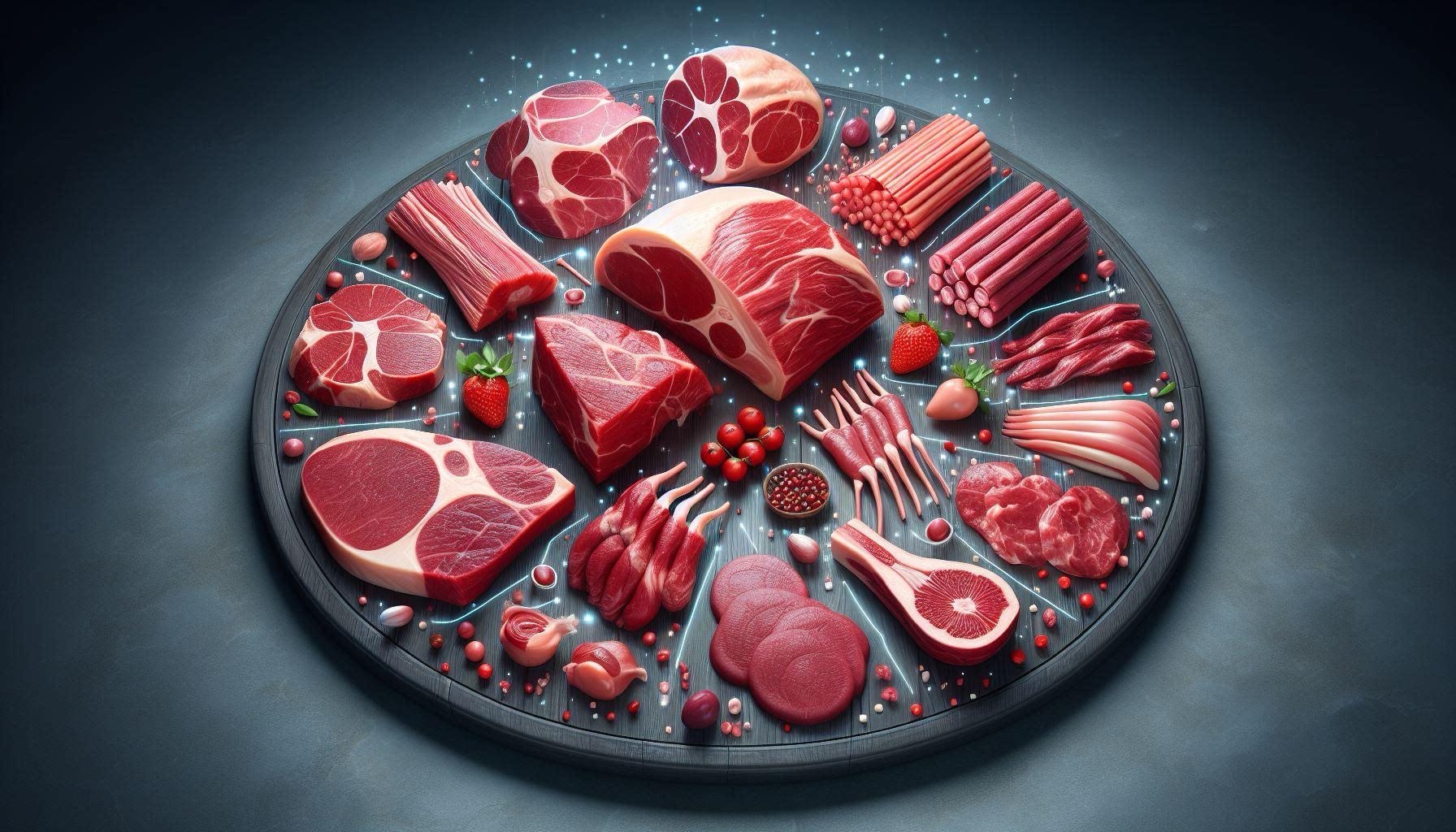Your cart is currently empty!

Is red meat healthy
The health effects of red meat consumption have been the subject of extensive scientific research. Here’s a summary based on scientific findings:

Created by DALL-E3
Nutritional Benefits:
- Red meat is a rich source of protein, vitamin B12, iron, zinc, and other essential nutrients that are important for muscle maintenance, immune function, and overall health³.
Health Risks:
- Heart Disease: Studies have shown that high consumption of red meat, especially processed red meat, is associated with an increased risk of heart disease. This is partly due to the saturated fats and heme iron found in red meat, which can contribute to increased cholesterol levels and atherosclerosis².
- Cancer: There is evidence to suggest that consuming large amounts of red meat may increase the risk of certain types of cancer, particularly colorectal cancer. The World Health Organization has classified processed meats as carcinogenic to humans and red meat as probably carcinogenic⁵.
- Diabetes: Regular consumption of red meat has been linked to an increased risk of type 2 diabetes. The risk is higher with processed red meat due to its high content of sodium and preservatives².
Moderation and Choice:
- The key to including red meat in a healthy diet is moderation and choosing leaner cuts to minimize intake of saturated fat and cholesterol. Opting for grass-fed and organic meats can also reduce exposure to antibiotics and hormones used in conventional meat production³.
Conclusion:
- While red meat can be part of a balanced diet due to its nutrient content, it is advisable to consume it in moderation and be mindful of the potential health risks associated with higher consumption. Balancing red meat intake with plenty of fruits, vegetables, whole grains, and other protein sources is recommended for overall health.
It’s important to note that individual dietary needs can vary, so it’s best to consult with a healthcare provider or a registered dietitian for personalized dietary advice..

Created with DALL-E3
The classification of red meat and processed meat as potentially carcinogenic is based on scientific evidence, not on dietary preferences or ideologies. The International Agency for Research on Cancer (IARC), which is part of the World Health Organization (WHO), has classified processed meat as “carcinogenic to humans” (Group 1) and red meat as “probably carcinogenic to humans” (Group 2A). This classification is based on evidence from hundreds of studies.
The main concerns regarding red meat and cancer are:
- Chemicals Formed During Cooking: Cooking red meat at high temperatures can lead to the formation of heterocyclic amines (HCAs) and polycyclic aromatic hydrocarbons (PAHs), which are chemicals known to cause changes in DNA that may increase the risk of cancer².
- N-Nitroso Compounds: In the body, chemicals found in red meat can be converted into N-nitroso compounds, which have been shown to damage the cells lining the bowel, leading to cancer².
- Heme Iron: The heme iron found in red meat can promote the formation of N-nitroso compounds and has been proposed to increase the risk of colorectal cancer².
It’s important to note that the risk associated with eating red meat is dose-dependent; the more red meat consumed, the higher the potential risk. The IARC’s findings support public health recommendations to limit intake of meat, while also recognizing its nutritional value¹².
These findings are part of a broader scientific discussion and are not created or promoted by any particular dietary group. They are intended to inform the public about potential risks and help people make informed choices about their diet.
Source: Conversation with Bing, 22/03/2024
(1) IARC Monographs evaluate consumption of red meat and processed meat. https://www.iarc.who.int/wp-content/uploads/2018/07/pr240_E.pdf.
(2) Cancer: Carcinogenicity of the consumption of red meat and processed meat. https://www.who.int/news-room/questions-and-answers/item/cancer-carcinogenicity-of-the-consumption-of-red-meat-and-processed-meat.
(3) Carcinogenicity of consumption of red and processed meat. https://meatscience.org/docs/default-source/publications-resources/iarc/2015-1026-lancet-iarc-finding.pdf?sfvrsn=83dc81b3_2.
(4) WHO report says eating processed meat is carcinogenic: Understanding …. https://www.hsph.harvard.edu/nutritionsource/2015/11/03/report-says-eating-processed-meat-is-carcinogenic-understanding-the-findings/.
(5) Red Meat Genetic Signature for Colorectal Cancer – NCI. https://www.cancer.gov/news-events/cancer-currents-blog/2021/red-meat-colorectal-cancer-genetic-signature.
Source: Conversation with Bing, 22/03/2024
(1) Does Red Meat Have Health Benefits? A Look at the Science. https://www.healthline.com/nutrition/is-red-meat-bad-for-you-or-good.
(2) Eating meat ‘raises risk of heart disease, diabetes and pneumonia …. https://www.theguardian.com/food/2021/mar/02/eating-meat-raises-risk-of-heart-disease-diabetes-and-pneumonia.
(3) What’s the beef with red meat? – Harvard Health. https://www.health.harvard.edu/staying-healthy/whats-the-beef-with-red-meat.
(4) What are the effects of only eating red meat?. https://microsoftstart.msn.com/en-gb/health/ask-professionals/in-expert-answers-on-meat/in-meat?questionid=iuo195tk&type=nutrition&source=bingmainline_nutritionqna.
(5) UK public now eating significantly less meat – BBC News. https://www.bbc.co.uk/news/science-environment-58831636.
(6) Mayo Clinic Q and A: Eating processed, red meats – what are the health …. https://newsnetwork.mayoclinic.org/discussion/mayo-clinic-q-and-a-eating-processed-red-meats-what-are-the-health-risks/.
(7) undefined. https://microsoftstart.msn.com/.
(8) en.wikipedia.org. https://en.wikipedia.org/wiki/Red_meat.
Discover more from The Truth About Food
Subscribe to get the latest posts sent to your email.

